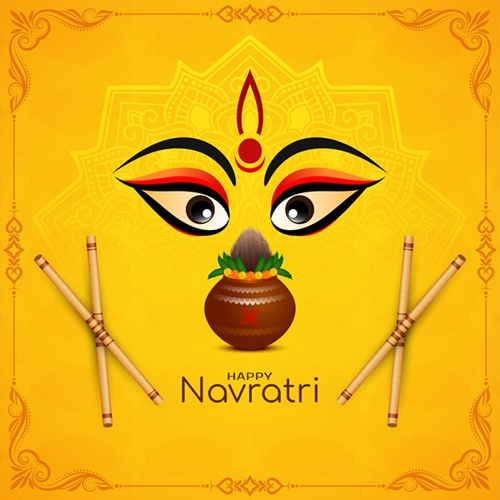Feb 24, 2026
Feb 24, 2026
Worship of Shakti and Pledge of Protection
India is a country where one can witness a unique confluence of tradition and modernity. Festivals like Navratri are not only symbols of religious faith but also carriers of cultural unity and social values. During Navratri, nine forms of Goddess Durga are worshipped, each considered a symbol of power, courage, patience, compassion, and justice.

Devotees observe fasts with great enthusiasm and devotion, participate in cultural events such as Garba and Dandiya, and sing praises of feminine strength. However, when the same society fails to ensure the safety of women and girls in real life, it presents a deep contradiction. On one hand, we bow with reverence to the Goddess, yet on the other hand, we constantly hear news of atrocities against women and girls. This irony not only questions religious devotion but also exposes the weakness of our social and moral framework.
Navratri teaches us to regard women as embodiments of power. But when we read reports of rape, sexual assault, and harassment in newspapers and see them on television, the question arises: has our worship become nothing more than a formality? In a country where it is said, “Yatra Naryastu Pujyante Ramante Tatra Devata” (where women are worshipped, there the gods reside), why do women continue to face discrimination and violence in every sphere of life? Crimes against women are not just numbers; they are reflections of the mindset and mentality of society. Reports from the National Crime Records Bureau consistently show not a decrease but an increase in crimes against women and children. In particular, incidents of child sexual abuse point towards a deep crisis within society. Shockingly, in most cases of child abuse, the perpetrators are not strangers but family members or close relatives. This makes the situation even more dangerous, as the victim—whether a child or a woman—often remains silent due to fear of the perpetrator, shame, or fear of social stigma. Many times, families suppress such matters to protect their so-called "honour." But this silence only emboldens the criminals further.
Modern media and the entertainment industry also indirectly contribute to this problem. In advertisements, films, and television serials, women are often portrayed as objects of consumption. Songs and videos glamorize vulgarity. This directly impacts young minds, shaping a mentality that views women not as dignified individuals but as mere objects.
Since independence, several laws have been enacted to ensure the safety of women and children. POCSO, the Nirbhaya Act, and many other strict provisions have been introduced. But simply making laws is not enough. The real challenge lies in their proper and timely implementation. The process of securing justice for victims is often so long and complicated that many hesitate to even file a complaint.
To deal with this situation, laws and punishments alone will not be sufficient; a change in the mindset of society is most important. For this, concrete steps are necessary. First, children should be taught not only academics but also moral and social values, so that they understand the fundamental principles of life such as respect, empathy, and coexistence. Alongside this, they must be taught to recognize and report inappropriate behaviour immediately to parents or trusted adults. Basic education such as "good touch" and "bad touch" should be imparted from childhood.
Training in self-defence for women and girls is also essential. If self-defence training is made compulsory in every school and college, it will not only boost their confidence but also create psychological deterrence for potential offenders. Moreover, society must understand that a crime against any woman or girl is not just the failure of one family but the failure of the entire society. Therefore, the fight against criminals must not be left to the victim’s family alone; the entire community should stand united, sending a clear message to perpetrators that they will not face isolated opposition but collective resistance. At the same time, the media and entertainment industry must recognize their responsibility. Content that demeans the dignity of women should be restricted, and instead, positive stories and inspirational examples should be promoted. Only then can a real transformation of mindset take place and women’s safety be ensured.
Navratri is not just a festival of fasting and celebration; it is an occasion that conveys the message of inner strength and courage. Each form of Goddess Durga teaches us that standing firmly against injustice and oppression is the true religion. For instance, Shailputri inspires us with determination, Chandraghanta teaches us the courage to face adversaries, and Katyayani symbolizes the defence of justice and righteousness. The worship of these forms can only be meaningful if we awaken these values within ourselves and show the courage to oppose the injustices and atrocities around us. Society often considers women weak and tries to suppress them. But the truth is that every woman possesses immense power within her. The need is to recognize this power and channel it in the right direction. If women and girls themselves raise their voices, no force that seeks to suppress them will prevail for long.
Navratri gives us the opportunity not only to worship the idol of the Goddess but also to recognize and honour the divine presence in every woman and girl in our society. To stop crimes against women and children, we must act on all four fronts—law, education, morality, and social responsibility. True Navratri will be when every woman or girl feels safe while stepping out of her home. When our actions, alongside our prayers, serve as proof that we genuinely respect power, only then will this festival become meaningful not just from a religious but also from a social perspective.
Image (c) istock.com
24-Sep-2025
More by : Munish Bhatia